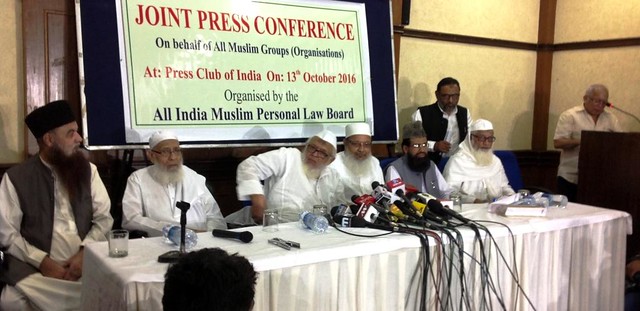By Misbahuddin Mirza for Twocircles.net
The present government’s attempt to specifically and selectively target the Indian Muslim Personal Law, while conveniently ignoring the serious negative aspects of scores of other Indian Religious/cultural/ personal/ laws is an overt attempt to suppress and disgrace India’s Muslims.
Muslims are not the only religious group that has a Personal Law. Indian Law also guarantees special provisions for the Christians, the people of Mizoram and Nagaland, the population of Goa, and numerous other religious/ cultural/geographic groups. Each Personal Law/ Special Provisions comes with their own unique set of rules and challenges.
Generally speaking, Islamic Law can be divided into two – criminal law, and civil law. In the 1,500 years of global Islamic History, Muslims have always allowed its non-Muslim citizens to follow their own civil laws (example: marriage, divorce, inheritance, etc.).
The October 19, 2016 issue of The Financial Express quoted BJP MP Subramanian Swamy as saying that “……we will unite the Hindus and will divide the minorities as much as possible.” The present government is trying to meddle with Muslims’ religious sentiments/requirements by using the pretext of triple talaq, and lack of alimony payment beyond the iddat period, to press ahead with its real agenda as articulated by Swamy.
To put things into perspective, a Muslim marriage is quite different from most other religious marriages. In Islam, marriage is considered as civil contract, similar to the countless contracts we sign throughout our lifetime. This means that at marriage time, both parties can set additional conditions, and if the other party is willing to accept those conditions, then an Islamic marriage can be solemnised. Misuse of power and responsibilities by a Muslim individual is despite Islam, not because of Islam.
India is a free country, and anyone who does not like any particular religious personal law, has the freedom to get married under the Special Marriage Act of 1954. So, in the presence of the Special Marriage Act of 1954, any attempt to reform a personal law automatically becomes questionable and suspect.
It is surprising that the Government has decided to look into the perceived negative issues of the Muslim Personal Law, while conveniently overlooking the negative aspects of the overwhelming majority of its citizens – i.e. Hindu marriage laws and other personal laws. Flavia Agnes (legal scholar and Director of Majlis Legal Center) stated that her organisation’s research shows that more than 90% of dowry related bride-burning-death cases that have reached the Supreme Court and Mumbai High Court, are among the Hindu community. This is despite the fact that dowry is illegal under Indian Law. Payment of Dowry by the bride is an essential part of the Hindu marriage religious rites and traditions. Agnes also explained that under Hindu religious practice, marriage is considered as a sacrament, and that in a recent court ruling a Hindu husband was granted a divorce as the wife did not want to stay with her in laws; that the notion of ‘joint family,’ and ‘joint family property’ are Hindu notions. Agnes also explained that the Hindu marriage custom/concept of Kanyadan, and Paraya Dhan are illegal under Indian Law.

One of the other objections cited as an issue with the Indian Muslim Personal Law is that of the issue of Polygamy. However, the 1961 Indian Census data shows that that the incidence of Polygamy was the least among the Indian Muslims, and that the Indian Hindus actually had a higher incidence rate of Polygamy, than the Indian Muslims.
From the above, any good administrator would have first focused on reforming the Hindu religious laws, and would have increased enforcement of the anti-dowry laws, so that the lives of scores of Hindu brides can be saved annually, and the lives of hundreds of millions of Hindu women can be bettered. Instead, the government has strangely decided to single out the Indian Muslims by targeting them for their different belief system.
It is worth noting that, in every single contract let by the State of New York, the Civil Rights Unit ensures that US minorities get a percentage of the Contract’s work, proportionate to the percentage of minorities living in the Borough where the work will be conducted.
Muslims constitute 14% of India’s population. Yet, Muslims hold only 1% of high paid jobs, and 4% of low paid jobs. The real and most critical problem facing the Indian Muslims is the uncertainty of where their next meal will come from. If the present Government really cared for the Muslims’ well-being, they would instead have focused on funding quality education, training, and ensured that 14% of the Indian jobs in each category is reserved for the millions of impoverished and destitute Muslims of India.
As India attempts to join the highly developed and civilised nations of the UN Security Council, India should first follow examples set by refined civilizations – such as New York State Government’s example – by providing Indian Muslims with quality education, and gainful employment.
The author is an Engineer based in New York and has written for major US and Indian publications

